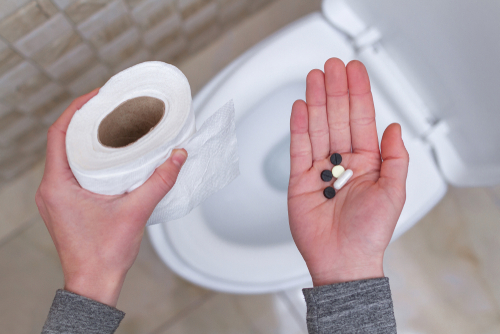
Look Out for Laxative Abuse: How Do You Know When It’s Too Much?
Laxatives are an easy to obtain drug that frequents many household medicine cabinets. There are many reasons people turn to laxative products. For some, it is at the suggestion of their primary care provider to help alleviate occasional constipation due to diet or age-related changes. For others, laxatives help to ward off constipation that is a side effect of certain medical treatments and pain-reducing medications. Unfortunately, not all who turn to laxative products do so for medically necessary reasons.
A growing number of people who struggle with disordered eating are tuning to laxatives as a way to maintain “needed” control over their food and caloric intake. In other cases, individuals who must maintain a specific bodyweight (athletes, for example) sometimes turn to laxatives to help shed unwanted pounds before a weigh-in or competition that requires meeting a weight goal. These unintended uses of laxatives can turn a relatively safe supplement meant for occasional use into a potentially dangerous that could benefit from dual diagnosis treatment (for laxative use and any underlying mental health condition) at a treatment facility Meadowglade.
What are Laxatives?
Laxatives are common over-the-counter supplements used to help relieve occasional constipation. They are available in several forms, including pills, powders, and liquids. The best type for each user will depend on their unique needs. For example, there are laxatives that are designed to create “bulk” and help increase the bulk of stool as fiber would. This helps bowel movements to be more productive. Other types of laxatives increase the water levels in stool, helping to make bowel movements easier. These are called osmotic laxatives. Stimulant laxatives are another form of laxative. Stimulants help to increase the speed of movement of material within the bowel. Finally, stool softeners help reduce the texture of the stools by making them softer. This process again helps to make bowel movements easier.
Laxative Abuse Explained
Laxative abuse is what occurs when someone who wants to lose weight (or maintain a possibly unhealthy weight) uses laxatives to accomplish their goals. Although laxatives do not help with weight loss, they do help with removing excess water and water weight. This is part of the reason laxatives have become increasingly popular as part of weight detox regimens.
To date, there are no studies that have confirmed a connection between laxative use and weight loss. The temporary weight loss that occurs is primarily due to water loss and bloat reduction (from water retention).
Eating disorders such as anorexia nervosa and bulimia nervosa are most commonly associated with laxative abuse; however, any form of disordered eating can include laxative abuse as a symptom. Also, laxative abuse coupled with disordered eating is a common dual diagnosis among teens and some obese populations. Some studies have noted that as many as 60% of people who struggle with disordered eating use laxatives in a manner contrary to suggested use. Of those, nearly 72% who struggle with purging anorexia abused laxatives. While laxatives may not be as addictive as other substances, they can be abused as a means to support mental health conditions and other emotional struggles such as shame, depression, anxiety, body dysmorphia, and a need to “fit in” to a particular group or image.
Effects of Laxative Abuse
The effects of long-term laxative abuse can be short and long-term. First and foremost, when someone uses laxatives on an ongoing basis, they will reduce levels of essential minerals in the body, including potassium, phosphates, magnesium, and sodium. These minerals are crucial to allow the muscles and systems in the body to work correctly. Without adequate amounts of these and other essential minerals, our body systems may not work correctly. Also, long-term laxative abuse can result in damage to the bowel, digestive systems and cause dehydration.
Laxatives are intended to help reduce bloating by helping pass stools through the bowels. Due to the nature of how laxatives work, most of the effects of laxative abuse are physical. Some of the most common signs of laxative abuse can include vomiting, dehydration, fainting, blurry vision. Depression, heart attack, muscle spasms, diarrhea, intestinal paralysis, bloody stools, electrolyte abnormalities, and increased occurrence of urinary tract infections.
In addition to physical health concerns, mental health issues (depression or related to disordered eating), and digestive dysfunction, there are other concerning risks associated with long-term laxative abuse. Some of these include increased risk for colon cancer, kidney failure, liver damage, damage to the bowel nerve, and damage to the gastrointestinal system. When someone experiences damage to the bowel nerve, it can result in poor function of the intestinal tract. Under these circumstances, the bowels may not operate properly, making someone feel as though they require laxatives to have proper bowel movements despite chronic and inappropriate laxative use being the cause of their ineffective bowel.
Laxatives Facts and Fiction
There are many myths surrounding laxative use. Unfortunately, many of these myths are rooted in misinformation. They can often lead someone who struggles with disordered eating or body dysmorphia to turn to laxatives as a means for maintaining or losing weight. Below are a few myths and truths about laxatives and their use.
It is necessary to use a laxative whenever you feel constipated
This is a myth. Feelings of constipation do not necessarily indicate someone is indeed constipated. This is especially true for those who struggle with disordered eating. Eating too little, too infrequently, or sporadically can result in feelings of constipation as the body attempts to use whatever foods are provided. Also, if you use laxatives too frequently, they can often have the opposite effect. Excessive laxative use can cause constipation and difficulties with bowel movement regularity.
Inducing bowel movements with laxatives can prevent food absorption and control weight gain
This is another rather dangerous myth. Inducing bowel movements or diarrhea with laxatives does not have a significant impact on how the body absorbs food. The perceived weight loss on experiences due to laxative use related to dehydration or water deprivation is due to how laxatives alter how the body retains water. Laxatives work most near the end of the bowel, which is where the body absorbs water and electrolytes. Consequently, most of the effects of laxatives occur after the nutrients from food have been absorbed into the body.
All laxatives are the same
While laxatives all have the same desired result, they work in different ways to achieve that goal. As noted above, there are several kinds of laxatives that help move stool through the body. There are stimulant laxatives, osmotic laxatives, and bulking agents. They each have different effects on them; however, misuse of any kind of laxative can have the same detrimental physical consequences.
Laxatives are perfectly safe to use
When used as directed and under the advice of a primary care provider, laxatives are safe to use. However, laxative abuse can be medically dangerous and can lead to irreparable physical damage to the bowel and gastrointestinal systems. Depending on the severity of one’s , the long-term symptoms of laxative abuse can lead to death.
How to Overcome Laxative Abuse
Unfortunately, ongoing laxative abuse becomes a vicious circle that can be difficult to get out of. Someone who abuses laxatives turns to them to “feel thin.” In a way, laxatives produce an immediate result; however, the exact opposite occurs before long. Soon, they find themselves “feeling fat” or “bloated” from excessive water retention. If you or a loved one struggles with laxative abuse, there are a few things you can do to break the cycle of their use.
The first options include lifestyle changes which can help promote a healthier lifestyle and reduce the perceived need for laxatives. First, stop using laxatives immediately and do not use them again unless recommended by and monitored by a physician. Next, be sure to drink at least six eight-ounce (decaffeinated) beverages each day. Although water can increase the sensation of bloat in the short term, restricting fluid intake will promote dehydration and worsens constipation. It is important to ensure adequate intake of decaffeinated beverages because caffeine acts as a diuretic.
Consuming excess caffeine promotes fluid loss, which also contributes to constipation. Next, eat regular meals consisting of foods that promote natural bowel movements. The healthiest foods that promote regular bowel function include grains, vegetables, and fruits. Of course, increasing your intake of fiber-rich foods should be accompanied by an increase in water. Finally, movement helps to enhance the regularity of bowel movements. If you are sedentary, try to start incorporating movement and low-impact exercise into your routine. It is important to discuss the frequency, type, and intensity of exercise with your primary care provider.
If you struggle with laxative abuse and co-occurring mental health concern such as disordered eating, it may be most beneficial for you to seek comprehensive therapy at a treatment center like Meadowglade. As part of a treatment program that addresses the root causes of your laxative dependency, your treatment provider can help you learn healthier ways to manage your mental health symptoms and coping strategies. If disordered eating is one of the leading “causes” of dietary (and bowel movement) change, it is essential to seek mental health treatment to help you recover from both challenges simultaneously.
If left untreated, the symptoms of disordered eating can lead to significant and potentially life-threatening physical and psychological outcomes. It is crucial to seek treatment at a facility where your treatment team will create an individualized treatment plan that addresses the physical, emotional, and spiritual symptoms that arise from laxative abuse and any underlying mental or physical health concerns.
If you or a loved one are concerned about laxative abuse, reach out to the team at Meadowglade today to learn more about how our programs can help you break the cycle.
Sources
